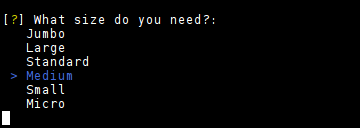| Tests |   |
| Downloads | 


|
| About | 



|
| Status | 

|
Collection of common interactive command line user interfaces, based on Inquirer.js.
Born as a Inquirer.js clone, it shares part of the goals and philosophy.
So, Inquirer should ease the process of asking end user questions, parsing, validating answers, managing hierarchical prompts and providing error feedback.
You can download the python-inquirer code from GitHub or download the wheel from Pypi.
Documentation has been moved to ReadTheDocs.
But here you have a couple of usage examples:
import inquirer
questions = [
inquirer.Text('name', message="What's your name"),
inquirer.Text('surname', message="What's your surname"),
inquirer.Text('phone', message="What's your phone number",
validate=lambda x, _: re.match('\+?\d[\d ]+\d', x),
)
]
answers = inquirer.prompt(questions)Shows a list of choices, and allows the selection of one of them.
Example:
import inquirer
questions = [
inquirer.List('size',
message="What size do you need?",
choices=['Jumbo', 'Large', 'Standard', 'Medium', 'Small', 'Micro'],
),
]
answers = inquirer.prompt(questions)List questions can take one extra argument carousel=False. If set to true, the answers will rotate (back to first when pressing down on last choice, and down to last choice when pressing up on first choice)
Shows a list of choices, with multiple selection.
Example:
import inquirer
questions = [
inquirer.Checkbox('interests',
message="What are you interested in?",
choices=['Computers', 'Books', 'Science', 'Nature', 'Fantasy', 'History'],
),
]
answers = inquirer.prompt(questions)Copyright (c) 2014 Miguel Ángel García (@magmax9), based on Inquirer.js, by Simon Boudrias (@vaxilart)
Licensed under the MIT license.


